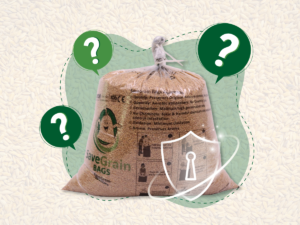The causes of an Indian Farmer’s distress

Even in the 21st century, agriculture is still the backbone of the Indian economy. As of 2016, 59% of India’s total workforce is part of the agricultural sector. However, the main drivers of this all-important sector, the farmers, are in a pitiable condition today. In fact, the Centre for Study of Developing Societies (CDS), conducted a survey. It said that 76% of farmers want to give up farming for other occupations. A significant factor that adds to a farmer’s woes and contributes to losses within the agricultural sector is food grain wastage in India.
Other factors of distress include:
- Erratic rainfall
- Loss of soil fertility
- Grain storage problems
- Inefficient and wasteful farming practices,
- Farmer debt
India is a country with a bountiful harvest of crops, especially in the states of Punjab and Maharashtra. However, it suffered from grain storage issues even before independence. As a result of the Green Revolution, it became the second in the world in terms of total food production. However, a lot of good grains went to waste due to inadequate food grain storage and preservation. It is estimated that 30% of total food production in India goes to waste. This is because of rotting and infestation due to inefficient grain storage and preservation facilities.
The Problems resulting from Food Grain Wastage
The Food Corporation of India (FCI) revealed that about 79 million tonnes of food grains went to waste between 2009 to 2013. According to a report by the Ministry of Consumer Affairs, 56,676 tonnes of stored food grains were damaged during 2013-2018.
India ranked 102 in the Global Hunger Index in 2019 due to this massive food grain wastage. This is a plummet of almost 50 ranks from its 2017 rank of 55.
Thus, today, India faces a problem of plenty in food grains, especially wheat and rice, particularly during the monsoon season.
All this food grain wastage has a negative impact on not only agriculture but also the economy. This affected farmers as well as consumers. Improper grain storage leading to massive wastage.As a result, this contributes to increase in prices of essential food products. Farmers, especially the small and marginalized farmers, are left bereft of any profit from their produce due to middlemen extracting their share before the food product reaches the consumers.
As of 2014, the Government admitted to having at least 610 lakh tonnes of wheat and rice grain stocks unused. This unused volume, in non-adherence to the FIFO (first in first out) principle, is twice the amount of permissible safe buffer. As a result, it directly contributed to making essential food items costlier in a poverty-stricken country. This is ironic, in light of having the second-largest volume of food production in the world.
Initiatives taken to alleviate the situation
Due to increasing food prices, the Government has not been able to successfully implement the Minimum Support Price (MSP) to help the farmers maintain a baseline of income from their produce. The Government now plans to provide minimum support income to the small and marginalized Indian farmers. This will help compensate for the MSP programme not being successful in alleviating the conditions of farmers. Increasing food prices impact even the poor and marginalized among consumers. India ranked 44 in Nomura’s Food Vulnerability Index in 2019.
To bridge the gap between food grain production and utilisation, the Government has taken a number of initiatives.
The CWC and Indian Railways, in a joint venture, as a Rail-side Warehousing Company Ltd., initiated the construction of go-downs at allocated Government land.
The FCI undertook pilot projects for rice silos at Kaimur and Buxar in Bihar to test out this technology. It awarded contracts to operators capable of constructing wheat silos with a capacity of 2.5 lakh tonnes.
Hermetic Bags as a means to counter Food Grain Wastage
On the other hand, hermetic bags are also a great option to counter grain wastage. Hermetic bags provide protection from pest attacks. Moreover, they are airtight which ensures that the food remains fresh and aromatic for a long time. This is an organic method of grain storage that offsets the ever-present problem of grain spoilage during storage in the country.
Save Grain Bags provides such organic grain storage solutions in the form of these hermetic storage bags. To take things a step further, these bags are recyclable and compliant with the plastic ban. Farmers and consumers can use the Save Grain Bags to store dry food produce in an organic and healthier manner.
To buy our products, click here.





